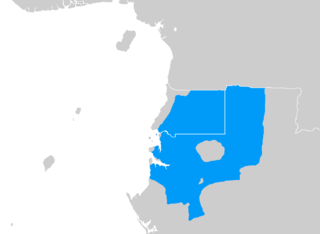Related Research Articles

Fang is a Central African language spoken by around 1 million people, most of them in Equatorial Guinea, and northern Gabon, where it is the dominant Bantu language; Fang is also spoken in southern Cameroon, the Republic of the Congo, and small fractions of the islands of São Tomé and Príncipe. It is related to the Bulu and Ewondo languages of southern Cameroon.
Mbum Proper is a Adamawa–Ubangi language of Central Africa. It is spoken by about 137,000 people in the Cameroon, Chad and Central African Republic.
The Mbum or Kebi-Benue languages are a group of the Mbum–Day branch of the Adamawa languages, spoken in southern Chad, northwestern Central African Republic, northern Cameroon and eastern Nigeria. Their best-known member is Mbum; other languages in the group include Tupuri and Kare.
Bube, Bohobé or Bube–Benga, is a Bantu language spoken by the Bubi, a Bantu people native to, and once the primary inhabitants of, Bioko Island in Equatorial Guinea. The language was brought to Bioko from continental Africa more than three thousand years ago when the Bubi began arriving on the island.

The Beboid languages are any of several groups of languages spoken principally in southwest Cameroon, although two languages are spoken over the border in Nigeria. They are probably not most closely related to each other. The Eastern Beboid languages may be most closely related to the Tivoid and Momo groups, though some of the geographical Western Beboid grouping may be closer to Ekoid and Bantu.
Baldemu, or Mbazlam, is a nearly extinct Afro-Asiatic language spoken in northern Cameroon. Baldamu is spoken in Bogo commune, Diamaré department, Far North Region by only 5 speakers as of 2012. Speakers have been shifting to Fulfulde.
The Nimbari language, which is no longer spoken, was a member of the Leko–Nimbari group of Savanna languages. It was spoken in northern Cameroon. Ethnologue lists Badjire, Gorimbari, and Padjara-Djabi villages as Nimbari locations in Bénoué and Mayo-Louti divisions.

The Mbam languages are a group of Bantu languages spoken in Cameroon
Ngwe is a Bamileke language spoken predominantly in Lebialem, Cameroon. As of 2001, Ngwe had 73,200 speakers, which was an increase from the numbers of previous censuses. Its closest relatives are Yemba and Ngiemboon.
Nzime (Koonzime) is a Bantu language of Cameroon, spoken by the Nzime and Dwe'e (Bajwe'e) people. Maho (2009) lists these as two languages.
Oblo is a poorly attested, unclassified, and possibly extinct language of northern Cameroon. It is, or was, spoken in a tiny area including Gobtikéré, Ouro Bé, and Ouro Badjouma, in Pitoa, Bénoué Department.
Iyasa is a Bantu language spoken in Cameroon and Equatorial Guinea by the Iyasa and Ndowe coastal fishing peoples. It is also spoken by Pygmies, perhaps Babongo, in Gabon. Approximately 3,000 people speak Iyasa, though some note that this number may be an overestimation.
Kogo, also referred to as Bakoko and Basoo, is a Bantu language of Cameroon. North and South Kogo are as distinct from each other as they are from Basaa; they might be considered three dialects of a single language.
Nyong (Daganyonga), also known as Mubako and Bali-Kumbat, is a Leko language spoken in two well-separated enclaves in Cameroon and Nigeria. Cameroonian speakers consider themselves to be ethnically Chamba.
Mbola is a village in the Bokito commune of the Centre Province of Cameroon. It is home to a small number of people who speak the Mbole language. As of 2007, there were just 100 speakers of this languages, none of whom were monolingual.
Mbola may refer to:
Sawabantu languages are a group of Bantu languages comprising most of zones A.20 and A.30 of Guthrie's classification, and most likely also part of zone A.10. According to Nurse & Philippson (2003), the A.20 and A.30 languages apart from Bubi form a valid node. The most important of these languages is Duala, which is a vehicular language.
Pol is a Bantu language of Cameroon. Pol proper is spoken in central Cameroon; the Pomo and Kweso dialects are spoken in Congo and the CAR near the Cameroonian border.
Mmem (Bafmeng) is a Grassfields Bantu language of Cameroon.
Iyive, also referred to as Uive, Yiive, Ndir, Asumbos, is a severely endangered Bantoid language spoken in Nigeria and Cameroon. The ethnic group defined by use of this language is the Ndir.
References
- 1 2 Mbule at Ethnologue (18th ed., 2015) (subscription required)
- ↑ Jouni Filip Maho, 2009. New Updated Guthrie List Online